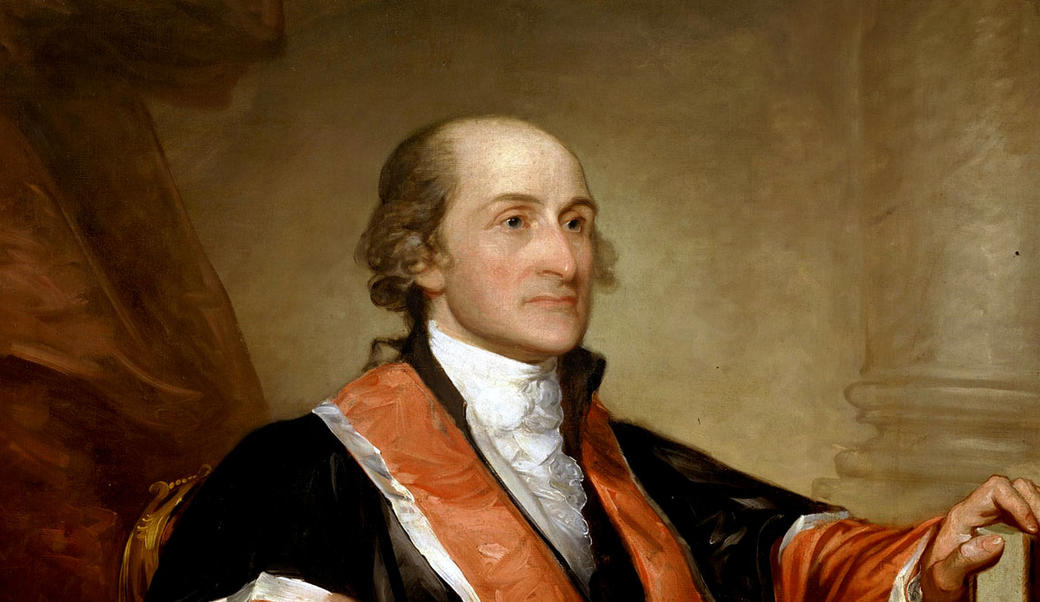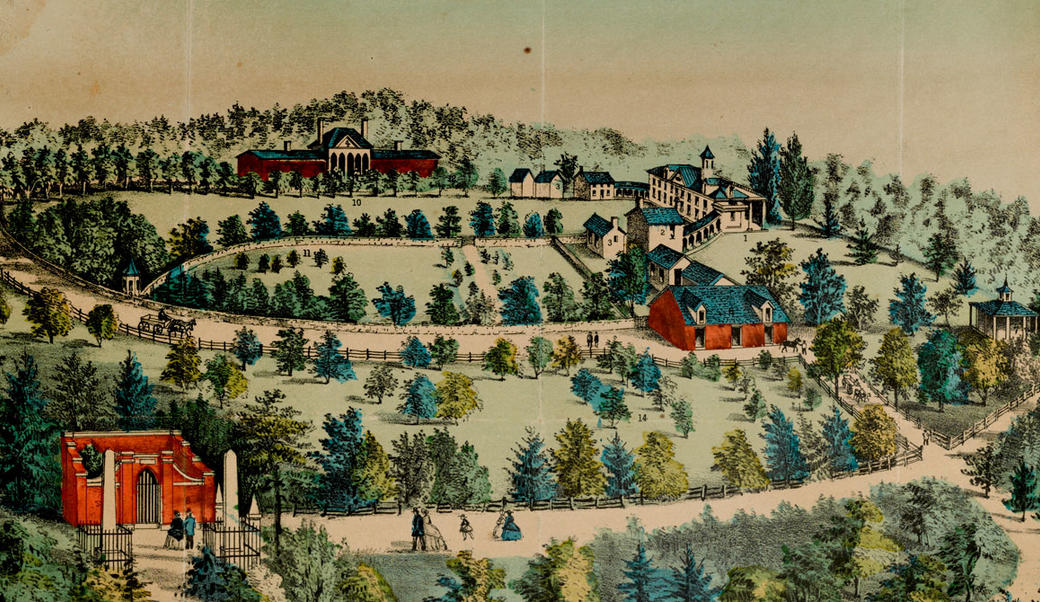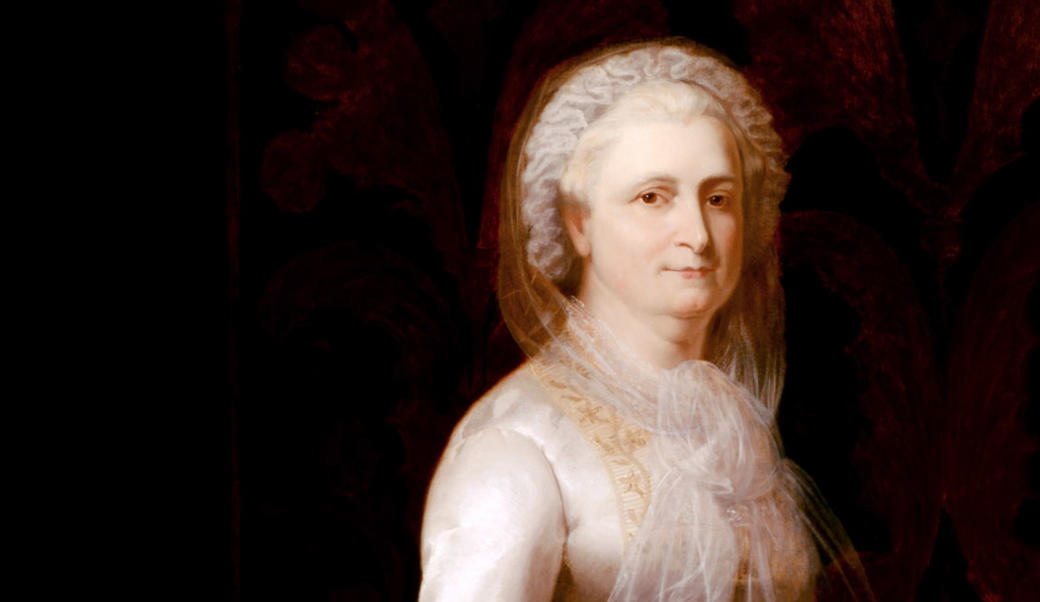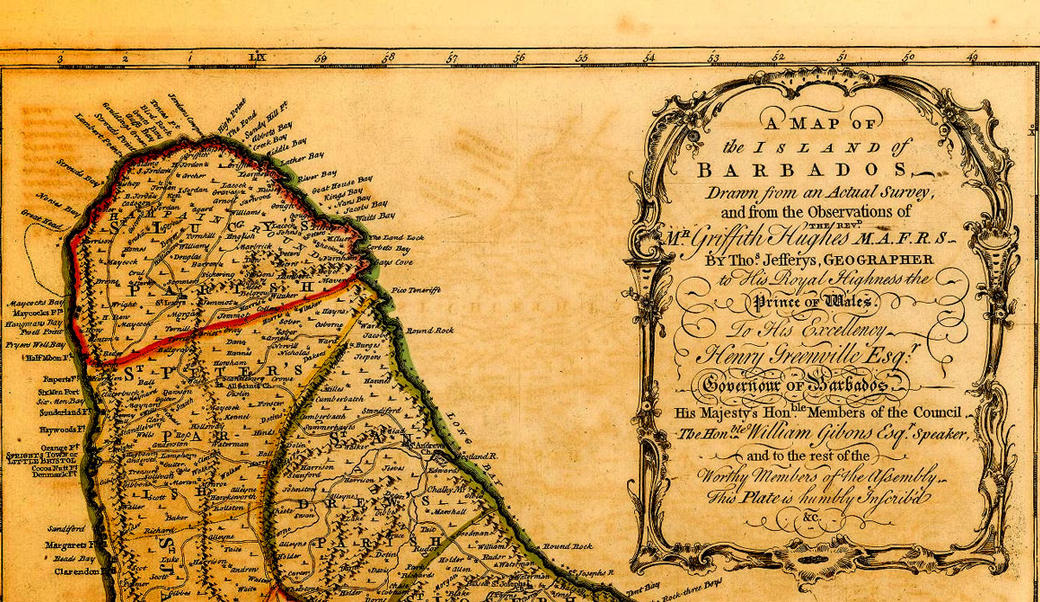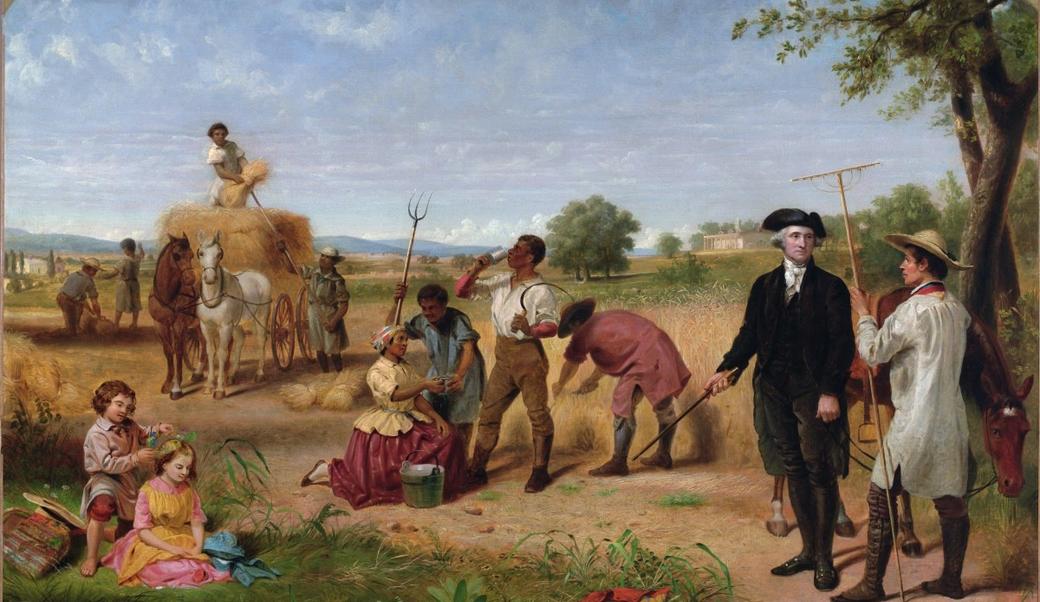George Washington: Life Before the Presidency
On February 22, 1732, Mary Ball Washington gave birth to the first of her six children, a boy named George. George’s father, Augustine, had been married once before and had three older children from his previous marriage. Over the next several years, the large family moved a few times, before settling at Ferry Farm on the banks of the Rappahannock River near Fredericksburg, Virginia.
When George was eleven, his life changed radically. His father died, and George’s older brothers inherited most of Augustine’s estate, including Little Hunting Creek Plantation, which later became Mount Vernon. George inherited one of the smaller estates and ten enslaved individuals who worked the farm.
Without a large inheritance, George relied on his family and connections to make his way in the world. Unlike his older brothers, he did not have the opportunity to study at a university. He spent his teenage years learning how to manage a plantation from his mother and mastering the science of surveying with the assistance of his neighbor, Colonel William Fairfax.
In 1751, George accompanied his favorite older brother, Lawrence, on a trip to Barbados. While in the Caribbean, George came down with smallpox. He survived and left the island with lifelong immunity, but the disease probably left him unable to father children and with a firsthand conviction about the dangers of the disease.
The trip to Barbados was also formative for Washington’s future. He toured the military structures on the island and was increasingly interested in a military career. Initially, George wanted to join the British Navy, and Lawrence promised to help secure him a position. Mary, George’s mother, had strong reservations about the physical abuse her son might receive in the navy and the limited possibilities for advancement. She was probably right, as life in the navy was often brutal and short-lived.
With his dreams of naval glory dashed, Washington looked west.
Early Career
By George’s seventeenth birthday, he received his first official commission to survey Culpeper County. He had learned the skills under the supervision of Colonel William Fairfax, his neighbor and one of the leading figures in Virginia. Just a few years later, Washington had completed almost 200 surveys of more than 60,000 acres.
In 1752, George’s older brother Lawrence died, and Washington appeared to lose interest in surveying as a profession and pursued a military career instead. In October 1753, he offered his services to Lieutenant Governor Robert Dinwiddie of Virginia, who planned to send an emissary to meet with the French in the Ohio Valley. The governor accepted Washington’s offer, and he headed west. Over the next few months, Washington became convinced that the French were planning a large military force to attack the British. Eager to warn Dinwiddie, George left the protection of the expedition and made his way on foot with one guide for company. After nearly drowning, freezing, and starving, he arrived in Williamsburg on January 16, 1754.
For his daring service, Washington was promoted to lieutenant colonel and ordered to raise men for an upcoming mission to drive the French out of the Ohio Valley. On his way to the Monongahela River, Washington encountered a French scouting party and determined that they had to be stopped before they revealed his location. He met up with Tanacharison, a local Native American chief, and they made their way to a French camp at Jumonville Glen. According to Washington’s later retelling of the events, when Washington intended to accept the French surrender, the Native American forces attacked and scalped many French soldiers. During the attack, the French commander, Sieur de Jumonville, was killed.
After the attack, Washington hastily built a small defensive enclosure he named Fort Necessity. On July 3, 1754, French forces surrounded the fort, and by the end of the day, Washington asked for terms of surrender. The French allowed the British forces to leave the fort in return for admitting to the assassination of Jumonville, an official ambassador. The terms were written in French, which Washington could not read. Washington never accepted this explanation, insisting that the French forces were spies and that the terms were unclear. The attack marked the start of the Seven Years’ War.
After the debacle at Jumonville, Washington joined Brigadier General Edward Braddock’s official family as an aide-de-camp. He accompanied Braddock on his march out west to capture the French Fort Duquesne (now Pittsburgh). French and Native American forces attacked the British line, killing most of the British officers and inflicting horrific casualties during the Battle of Monongahela. Washington won acclaim and promotion for his courage under fire and his efforts to manage an unruly retreat. For the next several years, he served as commander of the Virginia colonial forces before returning his commission at the end of 1758.
Mount Vernon
After leaving the military, Washington had a new position, a new fiancé, and a new home that demanded his attention. He won election to the Virginia House of Burgesses and took his seat in February 1759—one month after his wedding to the wealthy widow Martha Custis. The marriage was advantageous for George’s prospects, but also appears to have developed into a love match, or an amiable partnership at the very least. They wrote and spoke of each other with affection and desired each other’s company.
After their wedding, George and Martha resided at his plantation, Mount Vernon, which he had inherited when Lawrence’s widow died in 1761. Washington had grand plans for his new endeavors as a plantation owner. Over the previous several years, he had purchased dozens of enslaved individuals, and Martha brought 84 of the 300 enslaved laborers she owned to Mount Vernon, which added more manpower for the house and fields. Washington planned to expand the land and the house and revolutionize the farming practices. He began by purchasing lands surrounding the original 3,000 acres of the Mount Vernon estate, starting in 1757. By the time of his death, he owned nearly 8,000 acres.
Washington also quadrupled the size of the original house, from a one-and-a-half story, four-room house, to a 11,000-square-foot mansion, and he updated all the finishings and furnishings. Martha’s wealth funded the improvements, and she likely contributed to the décor and design decisions.
As Washington expanded his home to reflect his elite status, he also reformed his farm’s operations. He was one of the earliest plantation owners to recognize that tobacco damaged the soil. Spurred on by the falling prices, Washington ordered his enslaved laborers to switch over to grains, and he experimented with the latest techniques of fertilization and crop rotation methods.
Although Washington employed overseers to monitor the daily work of the enslaved workers in the field, he also assumed an active role in plantation supervision. He demanded regular reports of worker productivity and rode a large loop on horseback every day to check on the far corners of his estate.
Revolutionary War
Despite the Washingtons’ wealth, they found themselves in debt to British merchants due to the mercantilist system which governed the British Empire. The British government forced colonies to buy from and sell to British merchants, and the distance across the Atlantic Ocean exacerbated the inequalities within the system. For example, Washington sent his tobacco to a British merchant, who offered a low price. But by then, the tobacco was already in port, and Washington had no leverage. Similarly, he ordered fine goods like clothes, shoes, and jewelry from retailers in London, who supplied the goods and the bill. Again, Washington was forced to accept their prices. Washington was very sensitive about his status and honor and chafed at his inferior economic position.
These tensions boiled over when the British Parliament passed a series of taxation measures to pay down the debt accrued during the Seven Years’ War. From the British perspective, they had spent a fortune defending the colonies from the French. They believed that the colonists should contribute to these expenses. Additionally, colonists’ taxes were quite low—a fraction of what citizens in England paid.
But many colonists saw the taxes as confirmation that Britons viewed them as second-class citizens. The colonists had contributed to their own defense during the Seven Years’ War, and now Parliament demanded they contribute yet again.
Washington was not known for his oratory skills, but he encouraged the House of Burgesses to resist the taxation measures, and he personally abstained from purchasing British goods as part of a non-importation agreement. Colonists in Massachusetts went one step further. On December 16, 1773, a group of colonists boarded ships carrying East India Tea and dumped 342 chests of tea into the harbor. In retaliation, the British Parliament passed the Coercive Acts, also known as the Intolerable Acts. The acts closed the port of Boston and revoked self-government in Massachusetts until the colony paid restitution for the damaged tea.
These extreme measures appeared to punish the entire colony for the actions of a few unruly rebels, and they reminded the colonies that they were subjected to the whims of the British government. To formulate a unified response, the colonies agreed to send representatives to a Continental Congress. As one of the first delegates from Virginia, Washington agreed to form a Continental Association to manage communication between the colonies about the economic boycott of British goods. The delegates also crafted a petition to the king, imploring him to repeal the Intolerable Acts.
While the colonists waited for a response from the king, which never arrived, events in New England once against accelerated the conflict. In April 1775, British soldiers and local patriot militia clashed in Lexington and Concord, Massachusetts. The war had officially begun.
Commander-in-Chief
On June 14, the Second Continental Congress created the Continental Army. The next day, Thomas Johnson of Maryland nominated Washington as the first Commander-in-Chief. The delegates supported Washington’s nomination because he was one of the most experienced military commanders in the colonies. But his loyalty was also unquestioned, as he was born in North America and had never served in the British Army. Plus, he was a Virginian. Cooperation and unity among the colonies were required if they were going to win the war. Virginians were from the largest state and more likely to support the cause and the army if one of their own was at the helm.
Although Washington accepted the commission with the expected humility, he also welcomed the command. His choice to wear a uniform to the convention was no accident. After accepting the position, he wrote to Martha, “I could not think of departing from [Philadelphia] without dropping you a line; especially as I do not know whether it may be in my power to write again… I retain an unalterable affection for you, which neither time or distance can change.” He then made his way to Cambridge, Massachusetts, to meet the troops already fighting the war against the British.
Washington was sorely disappointed by the army that greeted him upon his arrival at headquarters. The troops were disorganized, the conditions unsanitary, discipline was in short supply, and the officers were squabbling amongst themselves over their titles. His first course of action was to enforce some semblance of order on the amateur army.
He then turned his attention to the stalemate in Boston. The Americans forces had settled in defensive positions on the hills surrounding Boston, while the British forces were holed up in Boston. Washington sent Henry Knox, one of his favorite generals, to retrieve recently captured artillery from Fort Ticonderoga. Once Knox completed the mission, Washington ordered his forces to install the artillery overlooking the Boston Harbor—in secret, in the dead of night. General Thomas Gage, the British commander, abandoned Boston once he discovered his navy was in the line of fire.
The American victory at Boston validated the cause for independence and proved the Battles of Lexington and Concord were not a fluke. But by the end of 1776, American spirits were suffering. Washington planned one last-ditch effort to boost morale. Many of his troops’ enlistments were about to expire, and nearly half of his army would disappear on January 1. Additionally, Washington knew the fledgling nation needed an emotional victory before the army entered winter camp.
Under the cover of night on Christmas, Washington and the ragged American forces crossed the Delaware River, attacking and defeating the British troops in Trenton, New Jersey. A few days later, General Charles Cornwallis counterattacked, but Washington escaped and marched on British reinforcements at Princeton. With the element of surprise, the Continental Army won back-to-back victories. Although the battles did not alter the course of the war, they offered powerful encouragement to a disheartened people.
Although Washington won important battles, such as Boston, Trenton, and Princeton, he lost more. The British forced him to abandon forts, artillery, and eventually New York City during the summer of 1776. The following year, the British sailed south and captured Philadelphia, forcing Congress to flee west. After enjoying the comforts and entertainment the city had to offer, the British Army abandoned Philadelphia. As they marched back to New York in 1778, Washington attacked the rear of the British line and was defeated at the Battle of Monmouth.
Without the benefit of a navy, Washington could not have held New York City or Philadelphia indefinitely, but strategic errors exacerbated his losses. In New York, he divided his forces and failed to properly reconnoiter the terrain. In Philadelphia and at the Battle of Monmouth, he devised battle plans too complicated for his army to execute.
Despite the mounting losses, the army survived, thanks to Washington’s other leadership strengths. He might not have been a great tactician, but he was a brilliant manager. From the beginning of Washington’s command, he understood his own limitations and surrounded himself with talented subordinates who brought expertise and experience that supplemented his own. He then cultivated good relationships and an esprit de corps among his troops.
Washington remained with the army for the duration of the war and never moved into comfortable winter quarters until his troops had their lodgings established. He refused a salary for the duration of the war and lobbied Congress for the army’s salary and pensions. The troops adored Washington for his commitment to them. Washington also cultivated a family atmosphere every winter. At his insistence, Martha and many of the officers’ wives joined them at winter quarters, where they hosted holiday balls and riding parties to foster a personal connection.
Foreign allies proved to be a critical part of the officer corps. Foreign officers, like Baron von Steuben, offered their expertise on drilling and helped whip the Continental Army into a sophisticated fighting force, while the Marquis de Lafayette brought much-needed funds and served as a diplomatic link to France.
Lafayette’s effective lobbying helped bring the French into the war, which made the conflict an international one and forced British forces to defend the mainland, as well as their holdings in the far east and the Caribbean. No longer could they direct their undivided attention toward their wayward North American colonies.
Washington also showed a willingness to evolve—how he thought about the army, his tactics, and his strategy. From almost the very beginning, Washington struggled to feed, clothe, and arm his forces, let alone find enough men to serve. To meet the demand, many northern states encouraged the enlistment of free and enslaved Black Americans, and many offered freedom in return for service for the duration of the war. Concerns about slave uprisings stymied similar measures in the South, but even southern states allowed free Black Americans to serve toward the end of the war. Black Americans also played an oversized role in the first American Navy, including 150 Black men in Virginia alone.
Initially, Washington opposed enlisting Black men as soldiers. But the shortage of soldiers forced him to reconsider this position, and the valor of Black troops challenged many of Washington’s ideas about race. Prior to the war, Washington showed little compunction about buying and selling enslaved individuals. But as the war progressed, he began to consider the injustices of slavery and the possibility of free Black Americans. After the war, he committed to keeping families together on his plantation and refused to buy or sell additional individuals. This evolution would continue over the course of his presidency and his retirement.
Washington also showed flexibility when it came to the direction of the war. By 1780, the war in the North had settled into a stalemate, and King George III and his ministers believed that the southern population remained loyal to the crown and hoped that Loyalist militias would flock to support a British attack. From December 1778 to the fall of 1781, the British Navy captured Charleston, South Carolina, and Savannah, Georgia, laid waste to ports along the Virginia coast, and invaded deep into the Virginia countryside.
Victory at Yorktown
Washington sent his best general, Nathanael Greene, to conduct a guerilla-style campaign against General Charles Cornwallis in the South. While Cornwallis won many of the skirmishes, Greene extracted a heavy cost and forced Cornwallis to retreat from North Carolina to Virginia to recoup his losses. Cornwallis made camp on the tip of a peninsula, near Yorktown, and waited for the British Navy to arrive with supplies and troops from General Henry Clinton in New York.
While Washington proposed recapturing New York City, the French commanders had other ideas. The French army commander, the Comte de Rochambeau, reported to Washington, but in name only. Washington needed the French Navy, led by the Comte de Grasse, to launch a successful attack on a British position. Both de Grasse and Rochambeau preferred to take on the British in the Chesapeake Bay.
While the combined Franco-American forces marched south, the French fleet sailed from the Caribbean and drove the British Navy from the Chesapeake Bay. The French naval victory at the Battle of the Chesapeake closed off Cornwallis’s means of escape and the ability to supply his forces by water. On September 14, Washington arrived in Williamsburg, Virginia. Over the next several weeks, the French and American artilleries bombarded the British position, while the armies dug trenches closer and closer to the British lines. Finally, on October 17, a white handkerchief of surrender flew over the British wall.
After the overwhelming victory at Yorktown, Washington returned with his army to New York, where they set up headquarters just out of reach of the British, who were still holed up in the city. Although the fighting in North America had mostly stopped, Washington remained on guard against British trickery. He also worked to keep boredom at bay amongst the troops, as a restless and bored army could prove dangerous.
Washington’s concerns came to fruition in early 1783, when a group of officers conspired to challenge the Confederation Congress, an event which became known as the Newburgh Conspiracy. Most soldiers, both infantry troops and officers, were owed months, if not years, of back pay. They worried that Congress might attempt to disband the army without paying its debts when the war came to an end. Washington rushed to defuse the tensions by convening a gathering, where he delivered an address and shared a letter of support from Congress. To read the text, he pulled out his glasses and said to his men, “Gentleman, you must pardon me, for I have not only grown gray but almost blind in service to my country.” This theatrical tug on the soldiers’ heartstrings diffused any plot to overthrow the civilian government.
Six months later, American diplomats signed the Treaty of Paris, ending the Revolutionary War and securing independence for the colonies from Great Britain. In December 1783, Washington traveled to Annapolis, Maryland, and returned his commission to Congress. In the age of dictators, military despots, and monarchs, his voluntary surrender of power was extraordinary.
The American victory in the war was the product of three critical factors. First, Washington quickly grasped that if the army survived, so too would the cause for independence. Second, the American colonies were too large and dispersed to invade and subdue, especially because Britain wanted to wage a war for hearts and minds, but they could not retain good relations with the colonists and suppress a rebellion through force. Finally, French participation forced Britain to wage a war on several fronts, stretching its supply chains across the globe.
New Nation
The United States declared itself independent in July 1776, but the Treaty of Paris transformed that imagined independence into a reality. Congress had incurred considerable debt equipping and feeding the army, purchasing ammunition, and waging war. Now that the fighting was complete, that debt was due. The coffers were empty however, and the economy was in shambles.
European empires and Native American nations lingered in the wings, eager to take advantage of US weakness. Spain denied American ships access to the Mississippi River, which farmers depended on to transport their goods for sale. British forces encouraged Native American nations to defend their homelands from white encroachment and supplied funds and arms for these attacks.
Westerners demanded Congress address their security and economic needs, which placed Congress in a bit of a bind. People in the eastern regions did not share the same concerns, and they refused to pay for an army to defend the western border when settlers were responsible for instigating conflict with Native American nations. They also preferred Congress focus on negotiating treaties that would open Caribbean and European ports to Americans merchants, rather than the Mississippi River. As tensions between different regions increased, European empires encouraged troublemakers to consider seceding from the new country and returning to their protection.
Congress had no ability to address any of these rising tensions because it had no money to pay its existing debts, fund an army to protect western settlements, or pay for diplomacy. The Articles of Confederation did not authorize Congress to collect taxes. Congress could approve requisitions, basically requests, but it had no enforcement power, making the requests optional. By the mid-1780s, the states ignored the requisitions and focused on paying down their own debts instead.
Washington had long foreseen that congressional limitations would be a problem. As he prepared to return his commission in 1783, he wrote a circular to the governors of the states urging them to adopt the requisite reforms to empower Congress to govern. The states did not heed his warning. Even if some states favored reform, it was not an option. Amending the Articles of Confederation required unanimous consent—which states refused to give.
Shays' Rebellion
In 1786, Congress’s impotency came to a head when a group of farmers, led by Revolutionary War veteran Daniel Shays, shut down the courts in western Massachusetts to prevent the seizure of local farms for overdue tax bills. The Massachusetts government pleaded with Congress to send troops to quell the rebellion, but Congress had no funds to pay for troops and left Massachusetts to its own devices.
The government’s inaction horrified Washington who wrote to his friend Henry Knox, “If government shrinks, or is unable to enforce its laws; fresh manœuvres will be displayed by the insurgents— anarchy & confusion must prevail.”
The revolt was crushed after wealthy Boston merchants raised a private army, but the event convinced many Americans that serious reform was needed. Accordingly, Congress sent out invitations for a convention in Philadelphia in the summer of 1787.
Constitutional Convention
Many leaders understood that Washington’s participation was essential to the convention’s success, and the Virginia state legislature agreed and included his name on the slate of delegates. With much reluctance, Washington departed Mount Vernon on May 9. Official quorum for the convention was reached on May 25, and the delegates elected Washington as president of the Constitutional Convention. As president, Washington attended every single session.
Several debates dominated the discussions at the Convention: the proper balance of federal power versus state power; the balance between executive versus legislative power; the balance between big versus little states; and the role of slavery in all the previous equations.
After rebelling against a king, Americans had been reluctant to create another strong centralized power. However, the Articles of Confederation had demonstrated that a weak federal government would not work either. To address these dueling motivations, the delegates agreed to give key powers to the federal government—like raising funds, organizing a national army, dictating foreign policy, and enforcing the laws—but then also included a specific clause that reserved the remaining powers to the states.
Although Congress agreed on this compromise, many “anti-Federalists,” or those opposed to stronger federal power, still worried about the potential for federal overreach. This criticism later threatened to derail ratification. In response, Madison helped pass the first ten amendments to the Constitution in 1789, known as the Bill of Rights, which guaranteed personal liberties against federal encroachment.
The second debate focused on how authority would be delegated in a strong federal government. The war experience had convinced many that Congress was too inefficient to make many decisions quickly, but a strong single executive resembled a monarchy. The delegates compromised by giving both branches important powers, as well as the ability to check each other through vetoes and impeachment.
The delegates then turned their attention to apportioning power in Congress among the states. Small states, like Delaware and Vermont, worried larger states, like Virginia and New York, would bully them. On the other hand, bigger states wanted their larger populations to provide more voting power. After months of debates, the delegates agreed to base House of Representative apportionment on population, which would give more power to larger states, but each state would receive equal representation in the Senate.
Complicating all these debates was the ever-present specter of slavery. Southerners demanded the enslaved populations in their states count toward the population numbers. While many of the northern states had larger populations and more influence in 1787, the expanding enslaved population in the South threatened to dominate the House of Representatives in the future. Yet, northerners worried if they did not compromise, southern delegates would leave the convention, ending all hope of reform. They compromised and agreed to count enslaved individuals as 3/5 of a white individual for the purpose of representation in Congress.
Even if they had wished to, the delegates could not ignore slavery. Many of the delegates brought enslaved servants to Philadelphia to prepare food, mend clothing, care for their horses, and run errands. Additionally, a large population of free and enslaved Black Americans lived and worked in Philadelphia. Even in a northern city such as Philadelphia, slavery was entwined with every aspect of life.
While the final product was not everything Washington had hoped, he wrote to his friends that he “sincerely believe[d] it is the best that could be obtained at this time.” Washington’s contributions to the convention were twofold: his presence lent the convention credibility and his support helped secure ratification of the proposed Constitution.
On September 17, the convention wrapped its proceedings and submitted the Constitution to Congress for its consideration. Washington penned a cover letter expressing his support and included his signature as an effective endorsement of the project. After returning to Mount Vernon, Washington continued his efforts. He sent copies of the Constitution to his network urging their support. When he read articles or pamphlets that argued in favor of ratification, he forwarded them to editors and encouraged their publication.
The proposed Constitution provided for a single elected executive. Everyone knew if the states ratified the Constitution, then Washington would be the first president. Americans had trusted him with enormous authority once before and believed they could do so again.

